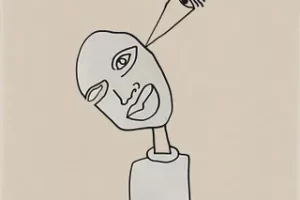via Pitchfork
The Omnichord was developed in Japan in the 1980s as a musician’s electronic accompaniment, incorporating a drum machine with rhythm and tempo controls, a set number of playable chords, and a “futuristic” touch-sensitive synthesizer ribbon. And while it has famous fans—Brian Eno, Joni Mitchell, and Damon Albarn, to name a few—it has always been a niche instrument: It’s mostly made of plastic, it feels like a toy, and it now sounds as cheap as it looks. In the hands of an exacting and protean virtuoso like Meshell Ndegeocello, deep into a decades-long career, the Omnichord became a tool for self-discovery.
In 2020, with no shows to play or sessions to sit in on, she found herself scoring three television shows—BMF, Queen Sugar, and Our Kind of People—simultaneously. At the end of marathon days spent collaborating remotely from her home in Brooklyn with an untold number of artists and executives, she would retreat to her attic. Alone with her thoughts and a gifted Omnichord, she would write, free of expectation, free to find things she wasn’t necessarily even looking for.
